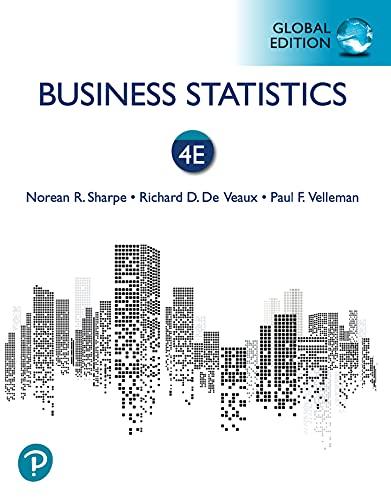Traffic delays. The Texas Transportation Institute (tti.tamu.edu) studies traffic delays. They estimate that in 2014 the average
Question:
Traffic delays. The Texas Transportation Institute
(tti.tamu.edu) studies traffic delays. They estimate that in 2014 the average commuter lost 42 hours in traffic congestion, compared to 18 hours in 1982, and wasted 19 gallons of fuel. Total costs of congestion reached $160B in lost productivity and fuel costs, or nearly 1% of US GDP, about 4 times the 1982 level. A large study was completed in 2015, but a 2001 study included physical variables like speed on the highway. Those data included measurements on the Total Delay per Person (hours per year spent delayed by traffic), the Average Arterial Road Speed (mph), the Average Highway Road Speed (mph), and the Size of the city
(small, medium, large, very large). The regression model based on these variables looks like this. The variables Small, Large, and Very Large are indicators constructed to be 1 for cities of the named size and 0 otherwise.
Dependent variable is: Delay/person R-squared = 79.1% R-squared (adjusted) = 77.4%
s = 6.474 with 68 - 6 = 62 degrees of freedom Source Sum of Squares df Mean Square F-ratio Regression 9808.23 5 1961.65 46.8 Residual 2598.64 62 41.9135 Variable Coeff SE(Coeff) t-ratio P-value Intercept 139.104 16.69 8.33 60.0001 HiWay MPH -1.07347 0.2474 -4.34 60.0001 Arterial MPH -2.04836 0.6672 -3.07 0.0032 Small -3.58970 2.953 -1.22 0.2287 Large 5.00967 2.104 2.38 0.0203 Very Large 3.41058 3.230 1.06 0.2951
a) Why is there no coefficient for Medium?
b) Explain how the coefficients of Small, Large, and Very Large account for the size of the city in this model.
Step by Step Answer:

Business Statistics
ISBN: 9781292269313
4th Global Edition
Authors: Norean Sharpe, Richard De Veaux, Paul Velleman






